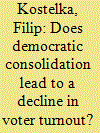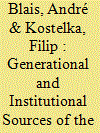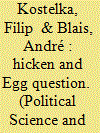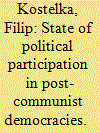| Srl | Item |
| 1 |
ID:
156696


|
|
|
|
|
| Summary/Abstract |
This article challenges the conventional wisdom that democratic consolidation depresses voter turnout. Studying democratic legislative elections held worldwide between 1939 and 2015, it explains why voting rates in new democracies decrease when they do, how much they decrease, and how this phenomenon relates to the voter decline observed in established democracies. The article identifies three main sources of decline. The first and most important is the democratization context. When democratizations are opposition-driven or occur in electorally mobilized dictatorships, voter turnout is strongly boosted in the founding democratic elections. As time passes and the mobilizing democratization context loses salience, voting rates return to normal, which translates into turnout declines. The second source is the democratic consolidation context, which seems to depress voter turnout only in post-Communist democracies. Finally, new democracies mirror established democracies in that their voting rates have been declining since the 1970s, irrespective of the two previous mechanisms.
|
|
|
|
|
|
|
|
|
|
|
|
|
|
|
|
| 2 |
ID:
181197


|
|
|
|
|
| Summary/Abstract |
Why has voter turnout declined in democracies all over the world? This article draws on findings from microlevel studies and theorizes two explanations: generational change and a rise in the number of elective institutions. The empirical section tests these hypotheses along with other explanations proposed in the literature—shifts in party/candidate competition, voting-age reform, weakening group mobilization, income inequality, and economic globalization. The authors conduct two analyses. The first analysis employs an original data set covering all post-1945 democratic national elections. The second studies individual-level data from the Comparative Study of Electoral Systems and British, Canadian, and US national election studies. The results strongly support the generational change and elective institutions hypotheses, which account for most of the decline in voter turnout. These findings have important implications for a better understanding of the current transformations of representative democracy and the challenges it faces.
|
|
|
|
|
|
|
|
|
|
|
|
|
|
|
|
| 3 |
ID:
159525


|
|
|
|
|
| Summary/Abstract |
Political scientists, analysts and journalists alike have long believed that the degree of satisfaction with the functioning of democracy determines voter turnout. We use survey data from 24 panel studies to demonstrate that this causal relationship is actually reversed: voter turnout affects satisfaction with democracy. We also show that this reversed relationship is conditioned by election type, electoral system, and election outcomes. These findings are important because: (1) They question conventional wisdom and a large body of scientific literature; (2) They invite a more nuanced approach towards the study of the relationship between evaluations of regime performance and political participation; and (3) They emphasize the vital role of elections in shaping citizens’ perception of the democratic process.
|
|
|
|
|
|
|
|
|
|
|
|
|
|
|
|
| 4 |
ID:
132943


|
|
|
|
|
| Publication |
2014.
|
| Summary/Abstract |
The article assesses the state of political participation in Central and East European post-communist democracies. Incorporating the most recent data, it compares the emerging trends in political participation to those observed in the established democracies of Western Europe. The findings reveal that post-communist citizens participate substantially less than their Western counterparts, and, contrary to some expectations, no convergence has been taking place. This is due to a host of factors, the importance of which seems to vary according to the type of political activity. It is subsequently shown that while political participation is lower than in Western Europe, it is not markedly more biased. The poor state of political participation therefore does not appear to seriously undermine the quality of the post-communist democratic process.
|
|
|
|
|
|
|
|
|
|
|
|
|
|
|
|